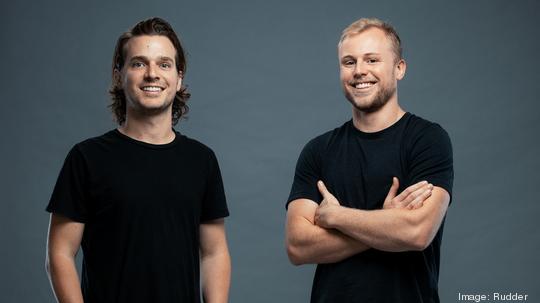
Daniel Bagbey and Colin Healy used their own experiences as freelance creatives to build Rudder, a platform that makes work-for-payment transactions simple and seamless.
Bagbey, a video producer, and Healy, an audio producer and musician, founded the Richmond startup in 2020 to automate that process as much as possible, expediting payment for both producers and creators.
The business partnership actually began as a client relationship when Bagbey produced a music video for Healy's band in 2018. After Bagbey sent Healy the electronic file and request for payment, he wondered if there was a better way to exchange product for payment could exist.
"Why isn't there a platform that I can go to in order to exchange a file for payment?” Bagbey said. “I want to have the confidence that when he gets his music video, I am also going to get my payment.”
Rudder eliminates the possibility of a freelancer not being paid for their work by linking deliverables to invoices and letting both parties know when a payment is past due. The platform won’t release a freelancer’s work to a client until the invoice is paid.
The team tested early prototypes on each other, eventually connecting with local company BLDR for market research and development of the user experience. They remained focused on what they wanted to improve most, namely, the payment process.
"You have a file and you need a payment,” Healy said. “Let's make that happen.”
Currently, freelancers can only send a payment invoice once they have delivered an electronic file to the client. The team is currently working on expanding the platform to provide invoicing on multi-stage projects, however. This means multiple invoices could be sent at different stages of a project to break up the payments, and the electronic file would be sent with the final invoice.
Rudder can be used by any freelancer and any client, and the platform has already gained traction with home inspectors and lawyers, Healy said.
Bagbey said while building Rudder, they realized banking and invoicing tools haven't kept pace with the freelancing industry’s ability to work quickly.
"The speed at which projects can be completed online has increased to create a proximity between freelancer and client that didn't exist up until a few years ago," he said. "We're bringing them closer together and making that transaction happen just as quickly as if they were in person."
Bagbey and Healy wanted the service to be fast and straightforward. They also wanted to make it easier to manage invoicing so it might function as a more simplistic accounting software. Through Rudder, users get an at-a-glance dashboard to see instantly whether invoices are paid.
Bagbey said they also wanted the service to flow both ways. With Rudder, a freelancer can send and receive payments using a single account.
"We could have built invoicing software but there are a million of those out there,” Healy said. “There is no other software out there where you upload your file; you give it a price; and you say who you're sending it to.”
Bagbey and Healy also continue to work on creative projects outside of Rudder, saying they want to remain users of the product in order to review the service from a customer's perspective.
"That's one thing we've always had going for us,” Healy said. “We are the people we're building this for.”